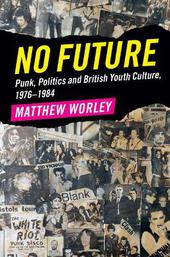
|
No Future: Punk, Politics and British Youth Culture, 1976-1984
Hardback
Main Details
| Title |
No Future: Punk, Politics and British Youth Culture, 1976-1984
|
| Authors and Contributors |
By (author) Matthew Worley
|
| Physical Properties |
| Format:Hardback | | Pages:414 | | Dimensions(mm): Height 235,Width 155 |
|
| Category/Genre | British and Irish History |
|---|
| ISBN/Barcode |
9781107176898
|
| Classifications | Dewey:305.235094109047 |
|---|
| Audience | | Professional & Vocational | | Postgraduate, Research & Scholarly | |
|---|
| Illustrations |
Worked examples or Exercises; 26 Halftones, black and white; Worked examples or Exercises; 26 Halftones, black and white
|
|
Publishing Details |
| Publisher |
Cambridge University Press
|
| Imprint |
Cambridge University Press
|
| Publication Date |
21 September 2017 |
| Publication Country |
United Kingdom
|
Description
'No Feelings', 'No Fun', 'No Future'. The years 1976-84 saw punk emerge and evolve as a fashion, a musical form, an attitude and an aesthetic. Against a backdrop of social fragmentation, violence, high unemployment and socio-economic change, punk rejuvenated and re-energised British youth culture, inserting marginal voices and political ideas into pop. Fanzines and independent labels flourished; an emphasis on doing it yourself enabled provincial scenes to form beyond London's media glare. This was the period of Rock Against Racism and benefit gigs for the Campaign for Nuclear Disarmament and the striking miners. Matthew Worley charts the full spectrum of punk's cultural development from the Sex Pistols, Buzzcocks and Slits through the post-punk of Joy Division, the industrial culture of Throbbing Gristle and onto the 1980s diaspora of anarcho-punk, Oi! and goth. He recaptures punk's anarchic force as a medium through which the frustrated and the disaffected could reject, revolt and re-invent.
Author Biography
Matthew Worley is a Professor of Modern History at the University of Reading. He has written extensively on British politics in the interwar period, and more recently on the relationship between youth culture and politics in the 1970s and 1980s. Articles on punk-related themes have been published in History Workshop Journal, Twentieth Century British History, and Contemporary British History. Recent works include Oswald Mosley and the New Party (2010) and, as a co-founder of the Subcultures Network, contributions to books such as Fight Back: Punk, Politics and Resistance (2015) and Youth Culture, Popular Music and the End of 'Consensus' (2015).
Reviews'Matthew Worley manages to strike a remarkable balance between vividly evoking punk's raucous rebellion, while also revealing how its aesthetics and politics disrupted the routines of British society. No Future is history as punk, and punk as history.' John Street, author of Music and Politics 'No Future cuts through the stodgy crust of nostalgia, self-serving memoir and fan-boy facts that conceals punk and reveals the truth of youth culture in late Seventies / early Eighties Britain: the internecine battles fought over issues of sound and style were inextricably linked to the political conflicts and dilemmas of that era. Digging deep into the fanzine squabbles and music press controversies that raged across the punk community, Matthew Worley brings to keen life the urgency of a period that felt at once like a terrifying crisis-time and the dawn of a new epoch delirious with radical possibilities. Giving Anarcho and Oi! the serious attention they've long deserved, and analysing this tumultuous time through perspectives that range from anti-consumerist boredom and feminist personal politics to media-critique and dystopian dread, No Future is an essential read for punk scholars and punk fans alike.' Simon Reynolds, author of Rip It Up and Start Again: Postpunk 1978-84 and Shock and Awe: Glam Rock and Its Legacy 'I've been involved with punk for most of my life but even for me it's easy to forget how diverse the whole movement was. This book reminded me of how exciting and different it all was and how 'real' punk had nothing to do with the media's myths. Look and learn my little droogs.' Steve Ignorant, former member of the band Crass 'A clear and engaged account of a complex and vexed topic.' Jon Savage, author of England's Dreaming 'Excellent account of how punk articulated itself as a political as well as musical force.' David Stubbs, Classic Rock 'Refreshing ... Worley throws unfamiliar views and new perception on his well-worn subject.' Record Collector 'British punk sought to shock and disturb. The Sex Pistols, the Clash, the Damned, the Slits, the Nips, Fatal Microbes, and scores of other bands combined a do-it-yourself ethos of amateur musical artistry with outrageous lyrics that excoriated the sacred traditions of conventional society. Historian Worley has written a scholarly book that places this cultural phenomenon within its historical context. He explains the emergence of punk within the faltering British economy of the 1970s. He also details the complex relationship of this music with the politics of the era, including its appropriation by elements of both the Left and the Right. Punk luxuriated in its transgressions but struggled against its inevitable incorporation by a musical industry long accustomed to catering to youthful fashions. British punk's often desperate nonconformity imposed its own curiously restrictive expectations on alienated insurgents who, like other cultural rebels before them, eventually succumbed to yet another musical trend. Worley writes well, and his sober analysis becomes enlivened by sentences that include such phrases as 'McLaren's situationist roots revealed themselves through Bow Wow Wow'. Over 100 pages of footnotes and bibliography. Summing up: recommended.' D. L. LeMahieu, Choice 'No Future is not just a vivid history of punk but also a vibrant and revealing historical journey through a particularly knotty period of contemporary British history. The story of punk, and the way its politics engaged with an enormous variety of socio-cultural concerns, is firmly established here as an enjoyable and informative route into considering some major issues in modern British history.' Benjamin Bland, Twentieth Century British History '... a richly textured work ...' David Fowler, American Historical Review
|